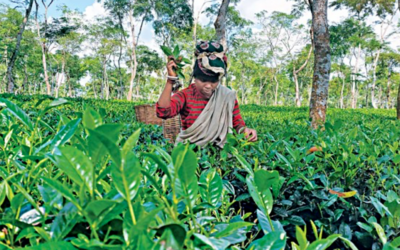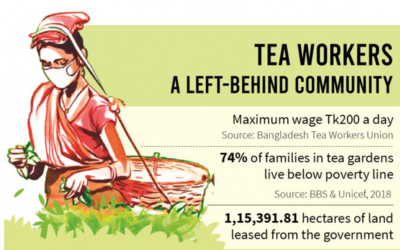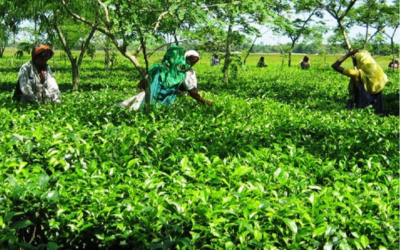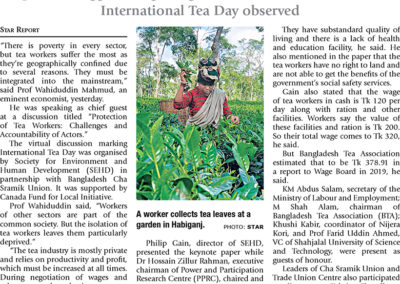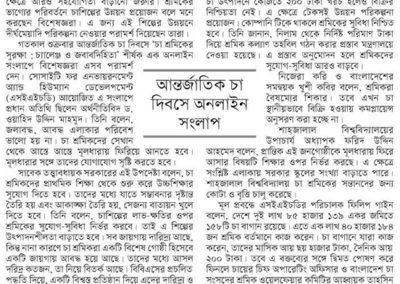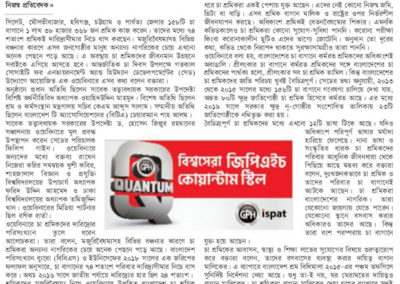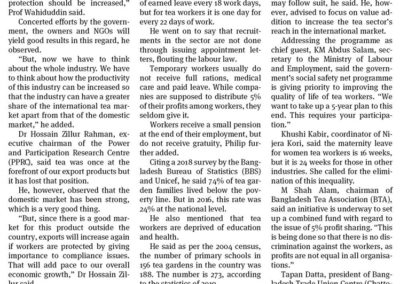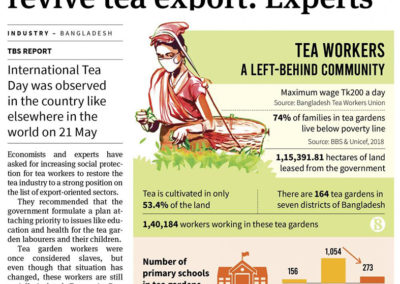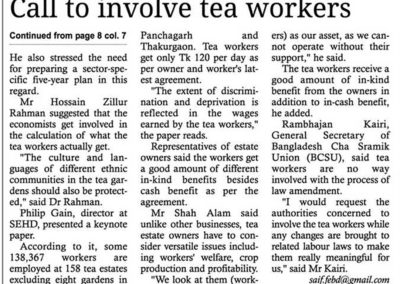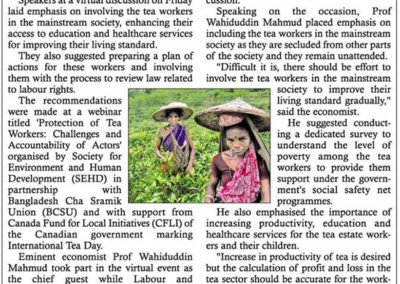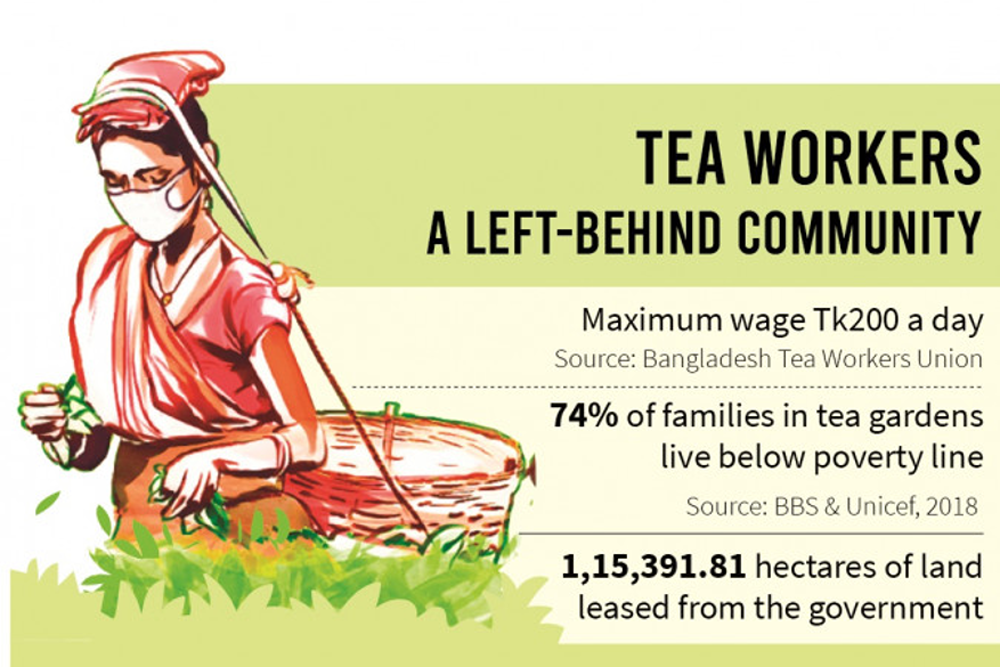
May 22, 2021 | CFLI, Dialogue Press Reports CFLI
Business Standard | FE Report | 22 May 2021
International Tea Day was observed in the country like elsewhere in the world on 21 May
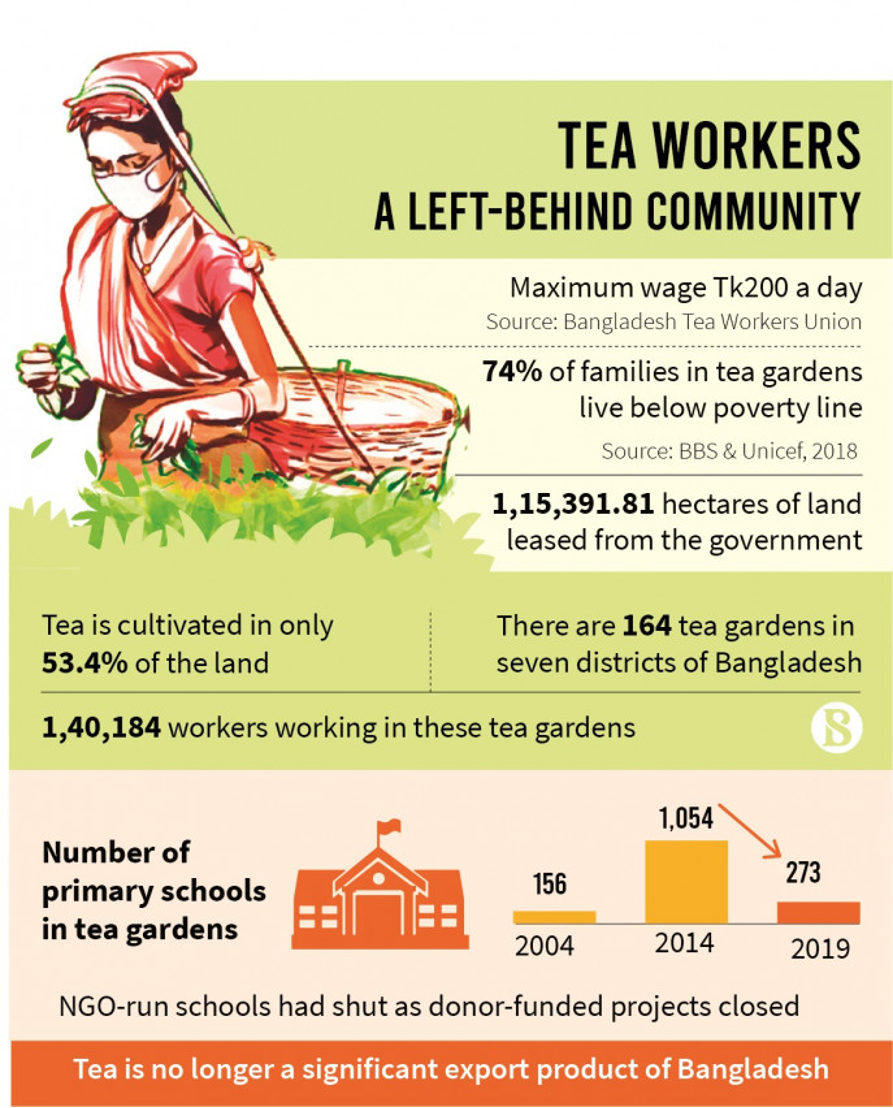 Economists and experts have asked for increasing social protection for tea workers to restore the tea industry to a strong position on the list of export-oriented sectors. They recommended that the government formulate a plan attaching priority to issues like education and health for the tea garden labourers and their children.
Economists and experts have asked for increasing social protection for tea workers to restore the tea industry to a strong position on the list of export-oriented sectors. They recommended that the government formulate a plan attaching priority to issues like education and health for the tea garden labourers and their children.
Tea garden workers were once considered slaves, but even though that situation has changed, these workers are still socially isolated, Economist Professor Wahiduddin Mahmud said in a webinar entitled “Tea workers of Bangladesh: challenges and accountability of actors” organised on the occasion of International Tea Day on Friday.
“We have to create opportunities for them. Aspiration must be awakened in them so that they can dream of becoming accomplished in society. To this end, a congenial environment must be created for their education. The scope of social protection should be increased,” Prof Wahiduddin said.
Concerted efforts by the government, the owners and NGOs will yield good results in this regard, he observed. “But, now we have to think about the whole industry. We have to think about how the productivity of this industry can be increased so that the industry can have a greater share of the international tea market apart from that of the domestic market,” he added. Dr Hossain Zillur Rahman, executive chairman of the Power and Participation Research Centre (PPRC), said tea was once at the forefront of our export products but it has lost that position.
He, however, observed that the domestic market has been strong, which is a very good thing. “But, since there is a good market for this product outside the country, exports will increase again if workers are protected by giving importance to compliance issues. That will add pace to our overall economic growth,” Dr Hossain Zillur said. Tea workers have now been brought under civic amenities, but their basic needs like education and health have not been fully ensured, he pointed out. “For this, we have to give importance to accurate statistics. The solution will come, if all the stakeholders plan together on the basis of factual information.”
In the keynote presentation, Philip Gain, director of the Society for Environment and Human Development (SEHD), highlighted various sorts of discrimination tea workers in the country face. When the number of casual leaves in other industries is 10 days, that is not the case in the tea industry, he said. There is also inequality in earned leaves, he said, adding that workers in other industries receive one day of earned leave every 18 work days, but for tea workers it is one day for every 22 days of work.
He went on to say that recruitments in the sector are not done through issuing appointment letters, flouting the labour law.
Temporary workers usually do not receive full rations, medical care and paid leave. While companies are supposed to distribute 5% of their profits among workers, they seldom give it. Workers receive a small pension at the end of their employment, but do not receive gratuity, Philip further added.
Citing a 2018 survey by the Bangladesh Bureau of Statistics (BBS) and Unicef, he said 74% of tea garden families lived below the poverty line. But in 2016, this rate was 24% at the national level. He also mentioned that tea workers are deprived of education and health. He said as per the 2004 census, the number of primary schools in 156 tea gardens in the country was 188. The number is 273, according to the statistics of 2019.
In 2014, the number of primary schools in tea gardens reached 1,054. At that time, non-government organisation Brac alone operated 789 primary schools in tea gardens but those are closed at present. Philip demanded that an adequate number of quality government schools be established and education opportunities be ensured there through the introduction of a quota system for the workers.
Professor Farid Uddin Ahmed, vice chancellor of Shahjalal University of Science and Technology (SUST), told the event, “As the first university in the country, we have introduced a quota to build tea workers’ children as first-class citizens. At present, 12 such students are studying in our university.”
Other local institutions in Sylhet may follow suit, he said. He, however, advised to focus on value addition to increase the tea sector’s reach in the international market. Addressing the programme as chief guest, KM Abdus Salam, secretary to the Ministry of Labour and Employment, said the government’s social safety net programme is giving priority to improving the quality of life of tea workers. “We want to take up a 5-year plan to this end. This requires your participation.”
Khushi Kabir, coordinator of Nijera Kori, said the maternity leave for women tea workers is 16 weeks, but it is 24 weeks for those in other industries. She called for the elimination of this inequality. M Shah Alam, chairman of Bangladesh Tea Association (BTA), said an initiative is underway to set up a combined fund with regard to the issue of 5% profit sharing. “This is being done so that there is no discrimination against the workers, as profits are not equal in all organisations.”
Tapan Datta, president of Bangladesh Trade Union Centre (Chattogram), mentioned that in 1921, owners used to beat workers by tying them up. “Even though that is not the case now, workers are still deprived of basic rights like education and health.” He also questioned the decision to keep the gardens open and indifference to protecting the health of workers amid the coronavirus pandemic.
https://www.tbsnews.net/economy/industry/improve-workers-life-revive-tea-export-experts-248968
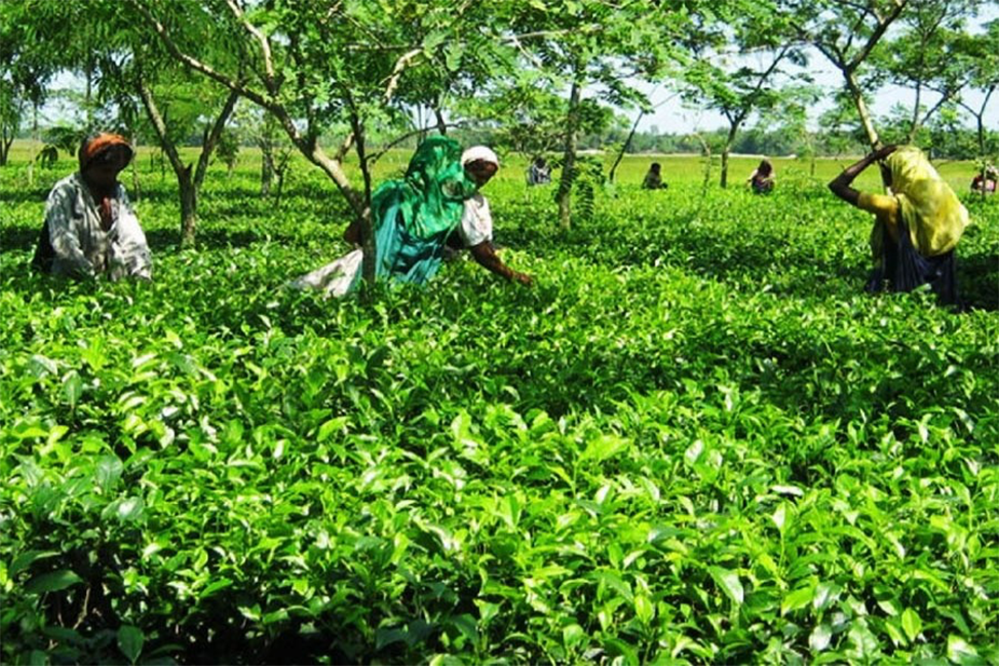
May 22, 2021 | CFLI, Dialogue Press Reports CFLI
Financial Express | FE REPORT | Published: May 22, 2021 09:53:01
Speakers at a virtual discussion on Friday laid emphasis on involving the tea workers in the mainstream society, enhancing their access to education and healthcare services for improving their living standard. They also suggested preparing a plan of actions for these workers and involving them with the process to review law related to labour rights.
The recommendations were made at a webinar titled ‘Protection of Tea Workers: Challenges and Accountability of Actors’ organised by Society for Environment and Human Development (SEHD) in partnership with Bangladesh Cha Sramik Union (BCSU) and with support from Canada Fund for Local Initiatives (CFLI) of the Canadian government marking International Tea Day.
Eminent economist Prof Wahiduddin Mahmud took part in the virtual event as the chief guest while Labour and Employment Secretary K M Abdus Salam as the special guest. Chaired by noted economist and chairman of BRAC Bangladesh Dr Hossain Zillur Rahman, the programme was attended by Bangladesh Tea Association (BTA) Chairman M Shah Alam as a guest of honour.
Representatives from owners, trade unions, academics and government officials and rights activists also took part in the discussion. Speaking on the occasion, Prof Wahiduddin Mahmud placed emphasis on including the tea workers in the mainstream society as they are secluded from other parts of the society and they remain unattended.
“Difficult it is, there should be effort to involve the tea workers in the mainstream society to improve their living standard gradually,” said the economist. He suggested conducting a dedicated survey to understand the level of poverty among the tea workers to provide them support under the government’s social safety net programmes. He also emphasised the importance of increasing productivity, education and healthcare services for the tea estate workers and their children.
“Increase in productivity of tea is desired but the calculation of profit and loss in the tea sector should be accurate for the workers to negotiate with the owners for their legitimate rights and benefits,” Prof Mahmud added. Mr Salam said a whole-of-government approach should be in place to solve issues related to workers’ welfare. He also stressed the need for preparing a sector-specific five-year plan in this regard. Mr Hossain Zillur Rahman suggested that the economists get involved in the calculation of what the tea workers actually get.
“The culture and languages of different ethnic communities in the tea gardens should also be protected,” said Dr Rahman. Philip Gain, director at SEHD, presented a keynote paper. According to it, some 138,367 workers are employed at 158 tea estates excluding eight gardens in Panchagarh and Thakurgaon. Tea workers get only Tk 120 per day as per owner and worker’s latest agreement.
“The extent of discrimination and deprivation is reflected in the wages earned by the tea workers,” the paper reads. Representatives of estate owners said the workers get a good amount of different in-kind benefits besides cash benefit as per the agreement. Mr Shah Alam said unlike other businesses, tea estate owners have to consider versatile issues including workers’ welfare, crop production and profitability. “We look at them (workers) as our asset, as we cannot operate without their support,” he said. The tea workers receive a good amount of in-kind benefit from the owners in addition to in-cash benefit, he added. Rambhajan Kairi, General Secretary of Bangladesh Cha Sramik Union (BCSU), said tea workers are no way involved with the process of law amendment. “I would request the authorities concerned to involve the tea workers while any changes are brought to related labour laws to make them really meaningful for us,” said Mr Kairi.
saif.febd@gmail.com
https://thefinancialexpress.com.bd/trade/call-to-involve-tea-workers-in-mainstream-society-1621655581?amp=true

May 22, 2021 | CFLI
A virtual dialogue, titled, ‘Protection of the Tea Workers: Challenges and Accountability of Actors’ organized by Society for Environment and Human Development (SEHD) in partnership with Bangladesh Cha Sramik Union and with support from Canada Fund for Local Initiatives (CFLI) of the Canadian Government was held on 21 May 2021, the International Tea Day.
 “The tea workers are tied to the tea gardens. They are in a very sorry state and socially excluded. Education can play a significant role in gradually freeing them.” Prof. Wahiduddin Mahmud, an eminent economist, said this as the chief guest in a dialogue on “Protection of Tea Workers: Challenges and Accountability of Actors”. Dr. Hossain Zillur Rahman chaired and facilitated the dialogue.
“The tea workers are tied to the tea gardens. They are in a very sorry state and socially excluded. Education can play a significant role in gradually freeing them.” Prof. Wahiduddin Mahmud, an eminent economist, said this as the chief guest in a dialogue on “Protection of Tea Workers: Challenges and Accountability of Actors”. Dr. Hossain Zillur Rahman chaired and facilitated the dialogue.
The virtual dialogue organized by Society for Environment and Human Development (SEHD) today (21 May), the International Tea Day, brought together representatives of Bangladesh Cha Sramik Union (BCSU) and Bangladesh Tea Association (BTA), academics, trade union leaders, government officials and rights activists.
The International Tea Day is a reminder of the long history and the deep cultural and economic significance of tea around the world. The day aims at promoting sustainable production of tea and its consumption and raising awareness of its importance in fighting hunger and poverty.
“Increase in productivity of tea is desired, but the calculation of profit and loss in the tea sector should be accurate for the workers to negotiate with the owners for their legitimate rights and benefits” added Prof. Mahmud.
The secretary of the Ministry of Labour and Employment (MOLE), K.M. Abdus Salam, the special chief guest at the dialogue informed that there are 63.5 million workers in Bangladesh including the tea workers (140,000). “Their social protection is among the top priorities of the government,” said the secretary. “We want to adopt a five-year plan to assist tea workers in all possible ways and SEHD can help us in this respect.”
The dialogue involved the representatives of BCSU, BTA and others based information, insights and analysis that Philip Gain, researcher and director of SEHD presented in his keynote paper, “Protection of Tea Workers: Challenges and Accountability”. The keynote paper has focused on the poor condition of the non-Bengali tea workers, tied to the tea gardens; low wages and meager fringe benefits; non-compliance with the labour law and labour standard and discrimination in the labour law; inequality and violence against women; misfortune with accommodation, health and education; complete landlessness of tea workers; and their social protection.
While the labour leaders Rambhajan Kairi and Tapan Datta argued strongly in support of the keynote paper and elaborated on the deprivation of the tea workers, Tahsin Ahmed Choudhury and M. Shah Alam, leaders of Bangladesh Tea Association (BTA) presented the owners view. One highly disputed issue was the wages that are paid to the tea workers. The labour leaders rejected the calculation of the owners that cash pay and other benefits paid to a worker a day amounts to Tk.400. They strongly argued that a worker gets hardly Tk.200 a day.
Dr. Hossain Zillur Rahman, a well-known economist and researcher on poverty suggested that the economists should get involved in calculation of what the tea workers actually get. “The culture and languages of different ethnic communities in the tea gardens should also be protected,” said Dr. Rahman.
Others who spoke at the dialogue included Sreemati Bauri, Juri Valley, Moulvibazar; Khushi Kabir, Coordinator, Nijera Kori & Bangladesh coordinator, One Billing Rising; Prof. Farid Uddin Ahmed, Vice Chancellor, Shahjalal University of Science and Technology (SUST) and Prof. Tanzimuddin Khan, University of Dhaka.
Facebook link to the dialogue: https://fb.watch/5De9nCcgCN/
The Daily Star.22 May 2021
Business Standard.P2.22 May 2021
Business Standard.P1.22 May 2021
Financial Express P2. 22 May 2021
Financial Express P1. 22 May 2021
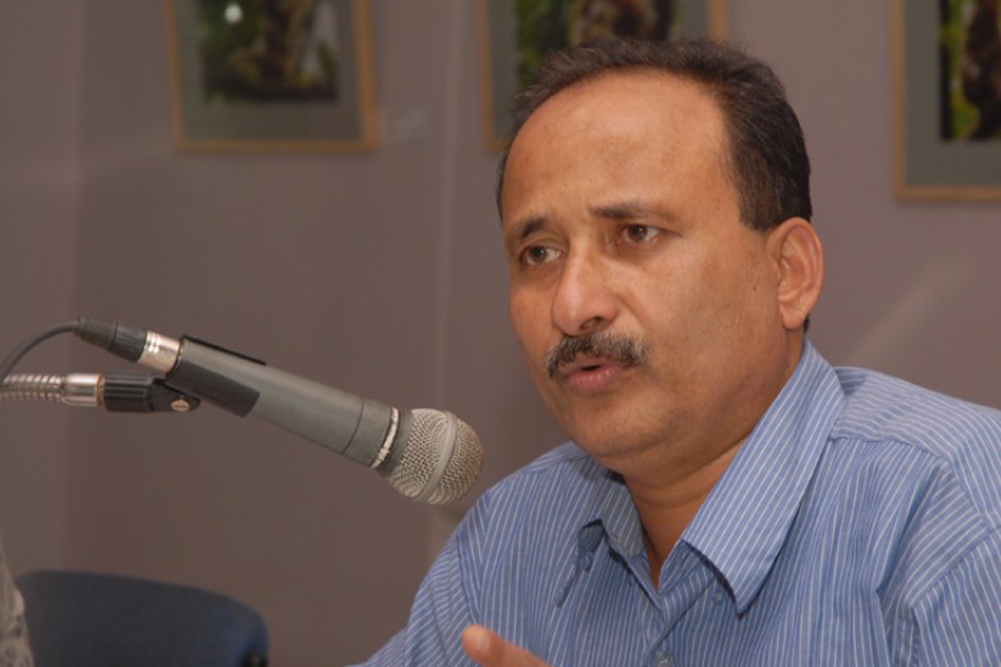
May 21, 2021 | CFLI, Dialogue Press Reports CFLI
ফিলিপ গাইন | বণিক বার্তা, মে ২১ ২০২১
২১ মে ২০২১। আন্তর্জাতিক চা দিবস। মূলত চা উৎপাদনকারী দেশগুলো দিবসটি পালন করে। জাতিসংঘের খাদ্য ও কৃষি সংস্থা দিবসটি পালনে মুখ্য ভূমিকায় থাকে। দিবসটি ঘিরে চায়ের টেকসই উৎপাদন ও সেবন নিয়ে যেমন প্রচার-প্রচারণা হয়, তেমনি ক্ষুধা ও দারিদ্র্য দূর করতে চায়ের ভূমিকার ওপরও গুরুত্বারোপ করা হয়। বাংলাদেশের সিলেট, মৌলভীবাজার, হবিগঞ্জ, চট্টগ্রাম ও রাঙ্গামাটি পার্বত্য জেলার ১৫৮টি চা বাগানে (পঞ্চগড় ও ঠাকুরগাঁওয়ের আটটি বাগান বাদে) যে ১ লাখ ৩৮ হাজার ৩৬৭ জন শ্রমিক কাজ করেন, তারা কেমন আছেন? আন্তর্জাতিক চা দিবসে এমন প্রশ্ন আসা স্বাভাবিক। কারণ এসব শ্রমিক ও তাদের পরিবার-পরিজন নিয়ে প্রায় পাঁচ লাখ মানুষ যে সীমাহীন দারিদ্র্য ও বঞ্চনার মধ্যে ডুবে আছে তার আলামত সুস্পষ্ট।
চা শ্রমিকরা যে বৈষম্য ও বঞ্চনার শিকার, তার বড় আলামত মেলে তাদের অত্যন্ত কম মজুরি থেকে। একজন চা শ্রমিকের দৈনিক নগদ মজুরি ১২০ টাকা (মালিক-শ্রমিকের সর্বশেষ চুক্তি অনুযায়ী যা ২০১৯-২০২০ সালের জন্য কার্যকর)। দৈনিক নগদ মজুরির সঙ্গে একজন শ্রমিক আরো যা পান, তার মধ্যে অন্যতম সাত-আট কেজি চাল বা আটা (সাড়ে তিন কেজি নিজের জন্য এবং বাকিটুকু স্বামী/স্ত্রী ও ১২ বছরের কম বয়সী সন্তানদের জন্য)। ভর্তুকি মূল্যে প্রতি কেজি চাল বা আটার জন্য তাকে ২ টাকা ব্যয় করতে হয়। স্থায়ী বা নিবন্ধিত শ্রমিক হলে প্রতি বছর ৪৭ দিনের মজুরির সমান উৎসব ভাতা পান, যা দুটি প্রধান উৎসবে দেয়া হয়। তার বসবাস লেবার লাইন বা শ্রমিক কলোনিতে এবং সেখানে তাকে ঘরভাড়া দিতে হয় না। এসবের পাশাপাশি তিনি আরো পান বিনা মূল্যে ন্যূনতম স্বাস্থ্যসেবা।
নগদ মজুরি ও অন্যান্য সুবিধা মিলিয়ে একজন শ্রমিকের বর্তমান দৈনিক আয় সর্বোচ্চ ২০০ টাকা বা মাসিক আয় ৬ হাজার টাকার বেশি নয়, এমন হিসাব দেন বাংলাদেশ চা শ্রমিক ইউনিয়ন নেতাদের অনেকে। কিন্তু বাগান মালিকপক্ষ চা শ্রমিকদের দৈনিক মজুরি ও শ্রমিককে দেয়া সুবিধার পুঙ্খানুপুঙ্খ হিসাব করে। তাদের হিসাবে ‘একজন চা-শ্রমিকের দৈনিক মজুরি দাঁড়ায় ২৭০ টাকা,’ বলেছেন বাংলাদেশ টি অ্যাসোসিয়েশনের (বিটিএ) একজন ঊর্ধ্বতন কর্মকর্তা। তবে জানা গেছে ২০১৯ সালে চা শ্রমিকদের জন্য গঠিত নিম্নতম মজুরি বোর্ডে একজন চা শ্রমিক দৈনিক সাকল্যে কী পান, তার একটি হিসাব দিয়েছে চা বাগান মালিকদের সংগঠন বিটিএ। এ হিসাব অনুসারে মাঠ পর্যায়ে যারা কাজ করেন, তারা পান ৩৭৮ দশমিক ৯১ টাকা এবং যারা কারখানায় কাজ করেন, তারা পান ৩৪৬ দশমিক ৯১ টাকা। এ হিসাব সর্বশেষ ২০১৯-২০-এর জন্য কার্যকর চুক্তি সইয়ের আগে যখন নগদ মজুরি ছিল ১০২ টাকা। অর্থাৎ এর সঙ্গে যোগ হবে আরো ১৮ টাকা। মালিকদের এ হিসাব শ্রমিকদের কাছে একেবারেই গ্রহণযোগ্য নয়।
যে বিষয়টি দিবালোকের মতো স্পষ্ট, তা হলো মজুরি বৈষম্যসহ বিভিন্ন ধরনের বঞ্চনার কারণে চা জনগোষ্ঠীর মানুষ অন্যান্য নাগরিকদের চেয়ে অনেক পেছনে পড়ে আছে। বাংলাদেশ পরিসংখ্যান ব্যুরো (বিবিএস) ও ইউনিসেফের ২০১৮ সালের এক জরিপের ফলাফল অনুসারে, চা বাগানের ৭৪ শতাংশ পরিবার দারিদ্র্যসীমার নিচে বাস করে। অথচ ২০১৬ সালে জাতীয় পর্যায়ে দারিদ্র্যের হার ছিল ২৪ শতাংশ। এমন অবস্থায় ধারণা করা হয় চা উৎপাদনকারী দেশগুলোয় বাংলাদেশের চা শ্রমিকরা সবচেয়ে কম মজুরি পান। তাদের গড় পারিবারিক আয় বাংলাদেশের জাতীয় বা গ্রামীণ দারিদ্র্যসীমা ও পারিবারিক আয়ের চেয়ে অনেক কম। আমাদের প্রতিবেশী দুই দেশ শ্রীলংকা ও ভারতে একজন চা শ্রমিকের দৈনিক নগদ মজুরি যথাক্রমে ৫ ও ২ মার্কিন ডলারের বেশি। এর ওপর যোগ হয় আবাসন, শিশুযত্ন এবং বিনা মূল্যে স্বাস্থ্যসেবা এবং অন্যান্য বাধ্যতামূলক ভাতা, যেমন উপস্থিতি ভাতা ও বোনাস এবং ‘ওভার কিলো পেমেন্ট’ (দিনের কোটা পূরণের পরে কাঁচা পাতা তোলার জন্য প্রদত্ত মজুরি)।
২০১৫ সালে শ্রীলংকার এক কেজি চা যখন ২ দশমিক ৯৯ ডলারে বিক্রি হয়, বিশ্ববাজারে তখন চায়ের দাম কেজিপ্রতি ২ দশমিক ৫৯ ডলার এবং চট্টগ্রামে নিলামে তখন চায়ের দাম কেজি ২ দশমিক ৪১ ডলার। শ্রীলংকার চা বিশ্ববাজারে সর্বাধিক দাম পাচ্ছে বটে, তার পরও বাংলাদেশের চায়ের গড় নিলাম মূল্য এত কম নয় যে এখানকার চা শ্রমিকদের দৈনিক নগদ মজুরি এমন কম হবে। শ্রীলংকায় চা উৎপাদন ব্যয়ের ৬৩ শতাংশ খরচ হয় শ্রমিকের জন্য ও ৪ শতাংশ যায় কর্মচারী ও ব্যবস্থাপনার খরচ মেটাতে। বাংলাদেশে চা শ্রমিকের মজুরি নির্ধারণের সময় দেখা উচিত তাদের মজুরি উৎপাদন খরচের কত শতাংশ।
‘বাংলাদেশ শ্রম আইন, ২০০৬’ একদিকে যেমন চা শ্রমিকদের প্রতি বৈষম্যমূলক, তেমনি এ আইনের অনেক ধারার লঙ্ঘন সুস্পষ্ট। শ্রম আইন কোনো প্রতিষ্ঠানপুঞ্জের ক্ষেত্রে কেবল জাতীয় পর্যায়ে ইউনিয়ন করার অধিকার দিয়েছে। সব চা বাগান মিলে একটি প্রতিষ্ঠানপুঞ্জ হিসেবে পরিগণিত। কাজেই চা শ্রমিকরা কেবল জাতীয় পর্যায়ে ইউনিয়ন করতে পারেন এবং একটি ইউনিয়ন করার জন্য মোট শ্রমিকের অন্তত ২০ শতাংশকে সদস্য হতে হবে। মালিক ও সরকারের কঠোর নিয়ন্ত্রণে ইউনিয়ন করার জটিলতা এমনই যে চা শিল্পে দ্বিতীয় কোনো ইউনিয়ন করা আপাতত একেবারেই অসম্ভব এবং এর কুফল সহজেই অনুমেয়।
অন্যান্য শিল্পে কর্মরত শ্রমিকদের ১০ দিনের নৈমিত্তিক ছুটি থাকলেও চা শ্রমিকরা এ ছুটি পান না। অন্যান্য শিল্পে কর্মরত শ্রমিকরা যেখানে ১৮ দিন কাজ করে একদিনের অর্জিত ছুটি পান, সেখানে চা শ্রমিকরা একদিনের ছুটি পান ২২ দিন কাজ করে। শ্রম আইনে বলা আছে, ‘কোনো মালিক নিয়োগপত্র প্রদান না করিয়া কোনো শ্রমিককে নিয়োগ করিতে পারিবেন না এবং নিয়োজিত প্রত্যেক শ্রমিককে ছবিসহ পরিচয়পত্র প্রদান করিতে হইবে।’ কিন্তু চা বাগানের অনেক শ্রমিক মালিকপক্ষের কাছ থেকে শ্রম আইন অনুসারে নিয়োগপত্র পান না বলে অভিযোগ আছে। এমন বহু অভিযোগ রয়েছে যে কোনো শ্রমিককে স্থায়ী করার আগে কয়েক বছর অস্থায়ী হিসেবে কাজ করানো হয়। অস্থায়ী হিসেবে কাজ করা শ্রমিকরা সাধারণত পুরো রেশন, চিকিৎসাসেবা ও মজুরিসহ ছুটি পান না।
২০০৬ সালের শ্রম আইন (অনুচ্ছেদ ২৩৪) অনুযায়ী, কোম্পানির মুনাফার ৫ শতাংশ শ্রমিকদের পাওয়ার কথা। মুনাফার এই অর্থ শ্রমিকদের অংশগ্রহণমূলক তহবিল ও শ্রমিক কল্যাণ তহবিলে জমা দেয়ার কথা, যা তারা সম্মিলিত সিদ্ধান্তের মাধ্যমে ব্যবহার করতে পারবেন। বর্তমান শ্রম আইন প্রণয়নের আগেও চা বাগানে এ বিধান ছিল। তবে চা শ্রমিকরা অতীতেও এই লভ্যাংশ পাওয়া থেকে বঞ্চিত ছিলেন, এখনো আছেন।
শ্রম আইন ও ২০১৫ সালের বাংলাদেশ শ্রম বিধিমালা অনুযায়ী, শ্রমিকদের আরো কিছু উল্লেখযোগ্য সুবিধা দেয়ার কথা থাকলেও সেগুলো থেকে তারা বঞ্চিতই থাকছেন। যেমন কর্মস্থলে টয়লেট ও প্রক্ষালন সুবিধা। যেখানে চা শ্রমিকরা চা পাতা তোলার কাজ করেন এবং যেখানে চা পাতা তোলা শ্রমিকদের ৯০ শতাংশের বেশি নারী, সেখানে না আছে টয়লেট, না আছে প্রক্ষালন কক্ষ। তাছাড়া খাবার পানির সরবরাহও সবসময় পর্যাপ্ত থাকে না, এমন অভিযোগও আছে।
যদি বাগান মালিকরা শ্রম বিধিমালা (অনুচ্ছেদ ৭৯) যথাযথভাবে অনুসরণ করেন, তাহলে বাগানের ৫০০ বা তার অধিক শ্রমিকদের জন্য একজন কল্যাণ কর্মকর্তা নিয়োগ দেয়ার কথা। যদি শ্রমিকের সংখ্যা দুই হাজারের বেশি হয়, তাহলে প্রত্যেক দুই হাজার শ্রমিকের জন্য একজন অতিরিক্ত কল্যাণ কর্মকর্তা নিয়োগ দেয়ার কথা। এসব কল্যাণ কর্মকর্তা বাগানের মালিক ও শ্রমিক, উভয়ের কল্যাণে কাজ করবেন।
চা শ্রমিকদের জন্য একটি বড় উদ্বেগের বিষয় হলো, তারা কোনো গ্র্যাচুইটি পান না। একজন চা শ্রমিক ৪০ বছর বা তারও বেশি সময় চা বাগানে কাজ করে গেলেন, অথচ কর্মজীবনের শেষে কোনো গ্র্যাচুইটি পেলেন না। তবে তারা কিছু পেনশন পান, যা বর্তমানে সপ্তাহে ১৫০ টাকা (২০০৮ সালে ছিল ২০ টাকা)। সংগত কারণে তারা এতে খুশি নন। তারা গ্র্যাচুইটি চান। বাংলাদেশ চা শ্রমিক ইউনিয়ন ও মালিকদের সংগঠন বাংলাদশ চা সংসদ (বিটিএ) ২০১৭ ও ২০১৮ সালের জন্য যে চুক্তি করেছিল, তাতে গ্র্যাচুইটি দিতে বিটিএ সম্মত হয়েছিল। কিন্তু অবসরে যাওয়া কোনো শ্রমিকই এখনো কোনো গ্র্যাচুইটি পাননি। আর ২০১৯-২০ সালের জন্য কার্যকর চুক্তিতে গ্র্যাচুইটির ব্যাপারে বলা হয়েছে, ‘গ্র্যাচুইটি: বাংলাদেশ শ্রম আইন, ২০০৬/২০১৩ অনুসারে হইবে।’
এমন কী ঘটল যে মালিকরা গ্র্যাচুইটি দেয়ার ব্যাপারে মত পাল্টালেন। শ্রমিকদের ইউনিয়ন গ্র্যাচুইটির জন্য অনেক চেষ্টা করেও মালিকদের সরাসরি অঙ্গীকার আদায় করতে পারেনি। এর অর্থ হচ্ছে মালিকরা অতীতে যেমন গ্র্যাচুইটি দেননি, তেমনি এখনো দেবেন না।
চা শ্রমিকের আবাসন, স্বাস্থ্য ও শিক্ষা-এসবই যেন দুর্ভাগ্যের আয়না। তাদের বসবাসের ব্যবস্থা করার দায়িত্ব বাগান মালিকের। এ ব্যাপারে বাংলাদেশ শ্রম বিধিমালা ২০১৫-এর পঞ্চম তফশিলে সুনির্দিষ্ট নির্দেশনা দেয়া আছে। শুধু তাই নয়, ঘর মেরামতের দায়িত্বও বাগান মালিকের। শ্রম বিধিমালার একটি গুরুত্বপূর্ণ ধারা [৭ (১) খ] অনুসারে, প্রতি বছর লেবার লাইনে বসবাসকারী শতকরা অন্তত ১০ ভাগ শ্রমিকের জন্য ‘মির্তিঙ্গা টাইপ’ (পাকা দেয়ালের) গৃহ নির্মাণ করতে হবে। গৃহের মেরামত, ব্যবহার ও দেখাশোনার জন্য মালিক-শ্রমিক উভয়ের দায়িত্ব শ্রম বিধিমালায় দেয়া আছে। চা শ্রমিকরা বাগান মালিকের দেয়া গৃহের ব্যাপারে সন্তুষ্ট নন। প্রথমত, বাগান মালিকরা যদি প্রতি বছর ১০ শতাংশ হারে ঘর ‘মির্তিঙ্গা টাইপ’ করে দিতেন, তবে চা বাগানের লেবার লাইন বা শ্রমিক কলোনিতে এখন আর কোনো কাঁচা ঘর থাকত না। বাংলাদেশ টি বোর্ডের ২০১৯ সালের পরিসংখ্যান অনুসারে, চা বাগানে পাকা ঘরের (মির্তিঙ্গা টাইপ) সংখ্যা ১৮ হাজার ৪৯০ আর কাঁচা ঘরের সংখ্যা ৫৭ হাজার ৫৯। এ অবস্থা আইনের সুস্পষ্ট লঙ্ঘন। গৃহ নিয়ে আরো নানা উদ্বেগ আছে, শ্রম আইন যেসবের মীমাংসা হওয়া দরকার।
পাতাতোলা শ্রমিকদেরই করতে হয় চা শিল্পের সবচেয়ে কষ্টের কাজ। বিশেষ করে গর্ভবতী নারীদের নিদারুণ কষ্টের মধ্যে গর্ভের সময় পার করতে হয়। তাদের অধিকাংশ সন্তান প্রসবের কাছাকাছি সময় পর্যন্ত ভারী ও কষ্টের কাজ করেন। ফলে অনেকের গর্ভপাত ঘটে এবং অনেকে মৃত সন্তান জন্ম দেন। তাছাড়া অধিকাংশ নারী বাড়িতেই মাটির ওপর করা বিছানায় অপরিচ্ছন্ন পরিবেশে সন্তান প্রসব করেন। ফলে মা ও শিশু উভয়ই ঝুঁকির মধ্যে থাকে।
চা বাগানগুলোয় বাগান ব্যবস্থাপনায় পরিচালিত হাসপাতাল ও ডিসপেনসারি আছে। কিন্তু এসব হাসপাতালে যে চিকিৎসা পাওয়া যায়, তাতে শ্রমিকরা সন্তুষ্ট নন। ক্যান্সার, যক্ষ্মাসহ বড় কোনো রোগে পড়লে বাগানের হাসপাতাল ও ডিসপেনসারিতে ভালো চিকিৎসা মেলে না। শ্রম আইন ও বিধিমালায় যেসব প্রসূতি কল্যাণ সুবিধা এবং অন্যান্য সুযোগ-সুবিধা চা শ্রমিক ও তাদের পরিবারের পাওয়ার কথা, তার অনেক কিছুই তারা পান না। তবে চা বাগানের কাছাকাছি যেসব সরকারি স্বাস্থ্য সেবাদানকারী প্রতিষ্ঠান আছে, সেখানে চা শ্রমিকদের যেতে বাধা নেই। তাদের কেউ কেউ সেখানে যাচ্ছেনও; সংগত কারণেই তাদের সংখ্যা কম।
চা শ্রমিকের জন্য মানসম্পন্ন শিক্ষা অত্যন্ত গুরুত্বপূর্ণ। চা বাগান মালিক ও ব্যবস্থাপনা কর্তৃপক্ষ যে শিক্ষার ব্যাপারে সবসময় উদাসীন থেকেছে, তার সপক্ষে জোরালো সব লক্ষণ আমরা দেখতে পাই। চা বাগানগুলোয় সরকারি প্রাথমিক বিদ্যালয় খুবই কম।
চা শ্রমিকদের ঠিকানা বাগানের মধ্যে স্থাপিত লেবার লাইন বা শ্রমিক কলোনি। চা বাগানগুলোয় ধানী জমি আছে ২৮ হাজার ২৭৫ দশমিক শূন্য ৫ একর। জঙ্গল কেটে যে সময় থেকে চা শ্রমিকরা চা বাগান তৈরি করেছেন, সে সময় থেকেই এ ধানী জমিও তৈরি করে তারা চাষাবাদ করছেন। কিন্তু তারা লেবার লাইনের জমি, ঘর এবং ধানী বা ফসলি জমি কোনো কিছুরই মালিক নন। এসব জমির মালিক সরকার। সরকার চাইলে চা বাগানের যেকোনো জমি যেকোনো সময় নিয়ে নিতে পারে। তবে চা শ্রমিকরা যে জমি চাষ করেন, তা কেড়ে নিতে গেলে তারা তীব্র প্রতিবাদ করেন এবং রাষ্ট্র ও বাগান মালিককে বুঝিয়ে দেন যে এ জমি তারা তৈরি করেছেন, যা দেড় শতাধিক বছর তাদের দখলে আছে। কাজেই এ জমির ওপর তাদের অধিকার জন্মেছে। চাইলেই এ জমি কেড়ে নেয়া যাবে না।
চা শ্রমিকরা ১৫০ বছরের অধিককাল বা পাঁচ প্রজন্ম ধরে যে জমিতে বসবাস ও চাষাবাদ করছেন, সে জমিতে মালিকানাস্বত্ব কি তারা কোনো দিন পাবেন না? এ প্রশ্ন চা বাগানের সর্বত্র শোনা যায়। ভূমির মালিকানা একটি গুরুতর বিষয়। এ নিয়ে সরকারের দৃষ্টিভঙ্গি ও করণীয় কী? সবাই জানতে আগ্রহী।
বাংলাদেশের চা শ্রমিক ও তাদের পরিবার-পরিজন শুধু দরিদ্র এবং পশ্চাত্পদই নয়। বিভিন্ন ভাষা, জাতি-পরিচয়, ধর্ম, সংস্কৃতি ও একটি বিশেষ পেশা অবলম্বন করে বেঁচে থাকা মানুষ এরা। এরা সামাজিকভাবে বিচ্ছিন্ন ও পেছনে পড়ে আছে। তাদের জীবনমান উন্নয়নে সমান সুযোগ-সুবিধাই যথেষ্ট নয়; দরকার আরো বেশি কিছু। কাজেই চা শ্রমিকদের প্রতি সুবিচার করতে হলে প্রথমেই শ্রম আইন ও শ্রম বিধিমালা তাকে যেসব অধিকার দেয়, সেসব নিশ্চিত করতে হবে। এরপর সামাজিক নিরাপত্তার জন্য রাষ্ট্র তাদের জন্য যে বরাদ্দ রেখেছে, তা আরো বাড়াতে হবে। ভূমির মালিকানা বঞ্চিত চা বাগানে ‘বাঁধা’ পড়া এসব মানুষের জন্য আরো অনেক কিছু করার আছে তাদের নিয়োগদাতা, রাষ্ট্র এবং সংখ্যাগরিষ্ঠ মানুষের। তাদের ভাষা ও সংস্কৃতি রক্ষা এবং বৈচিত্র্যময় জাতি-পরিচয় বাঁচিয়ে রাখতে রাষ্ট্রের পক্ষ থেকে যা যা করা সম্ভব, তাদের সঙ্গে পরামর্শ করে সেসব ব্যাপারে জরুরি ভিত্তিতে পদক্ষেপ নেয়া দরকার। সামাজিক ন্যায়বিচার ও রাজনৈতিক সুরক্ষাই পেছনে পড়ে থাকা চা শ্রমিক ও তাদের পরিবার-পরিজনকে মুক্তির পথ দেখাতে পারে।
ফিলিপ গাইন: পরিচালক, সোসাইটি ফর এনভায়রনমেন্ট অ্যান্ড হিউম্যান ডেভেলপমেন্ট (সেড)

 Economists and experts have asked for increasing social protection for tea workers to restore the tea industry to a strong position on the list of export-oriented sectors. They recommended that the government formulate a plan attaching priority to issues like education and health for the tea garden labourers and their children.
Economists and experts have asked for increasing social protection for tea workers to restore the tea industry to a strong position on the list of export-oriented sectors. They recommended that the government formulate a plan attaching priority to issues like education and health for the tea garden labourers and their children.


